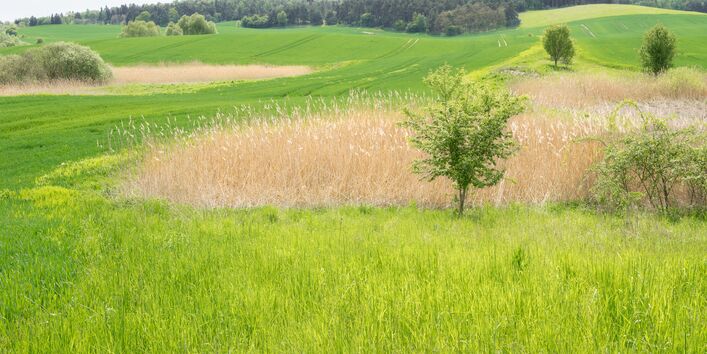Environment and agriculture – Overview for Germany
More than half of Germany's surface area is used for agriculture. Agriculture thus is the largest land user in Germany and a significant contributor to environmental stress. On the other hand, agriculture is also affected, for example, by the effects of climate change. In the flyer "Environment and agriculture 2018" UBA presents key facts about agriculture and environment.
Excessive inputs of nitrogen compounds into the environment have negative effects on climate, biodiversity and landscape quality. If, for example, more nitrogen is applied to agricultural soils by manure fertilizers (from animal farming or mineral fertilizers) than is extracted from the cultivated plants, excess nitrogen compounds can enter adjacent waters or the air. For example, about 95 percent of ammonia emissions into the air originate in agriculture. They have a fertilizing and acidifying effect and thus contribute to the pollution of sensitive ecosystems, such as bogs. In parts of northern Germany with intensive animal farming, the critical loads have already been exceeded.
Excess nitrogen can enter the groundwater as nitrate. In areas where arable land and special crops dominate, the nitrate-levels clearly exceed the critical load of 50 milligrams per liter more frequently than in areas dominated by forests, meadows or even settlements.
Agriculture is the second largest emitter of greenhouse gases after the energy sector. Above all, these are methane emissions from livestock farming, the storage and application of manure, and nitrous oxide emissions from agricultural soils, partly as a result of high nitrogen surpluses. On the other hand, agriculture is also affected by climate change. For example, projections indicate hotter and drier summers, resulting in a lack of precipitation, especially in the period of main plant growth.
In rural regions with intensive, industrial farming, biodiversity is highly endangered. In order to assess this, the German government uses the presence of bird populations in various types of landscapes. The sharpest decline of birds is recorded in farmland.
Organic farming is a sustainable, resource-friendly and environment and animal-friendly way of farming. With a share of 7.5 percent of agricultural area in 2016 and considering Germany’s role as the largest market for organic foodstuffs in Europe with steady sales growth, organic farming takes up too little area.
Reliable and adequate financial support for organic farming as well as legal certainty are necessary to encourage farmers to convert to and continue organic farming.
